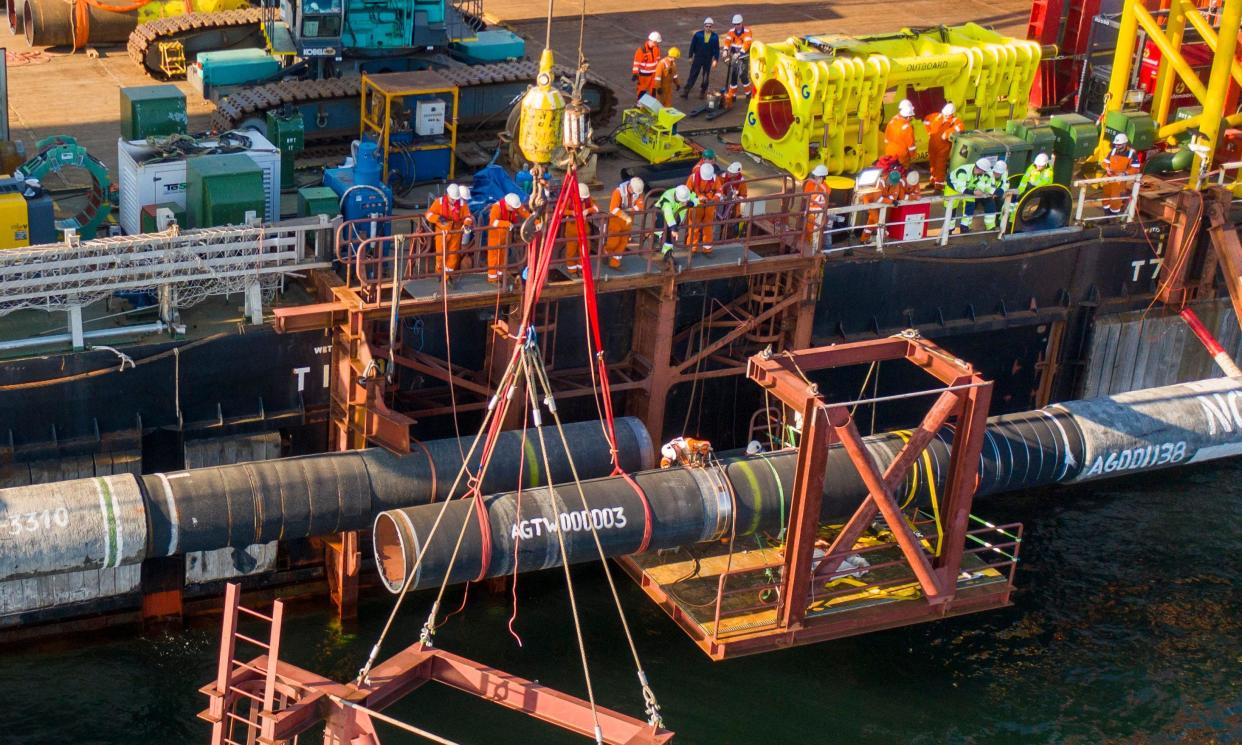Germany halts Nord Stream 2 approval over Russian recognition of Ukraine ‘republics’

Chancellor Olaf Scholz suspends gas pipeline over ‘grave breach’ of international law
Germany has stopped the certification process for the controversial Nord Stream 2 gas pipeline in reaction to Russia’s recognition of the self-proclaimed republics in Luhansk and Donetsk in east Ukraine, chancellor Olaf Scholz has announced.
Germany’s energy minister, Robert Habeck, on Tuesday morning instructed the withdrawal of a security of supply assessment granted under Angela Merkel’s tenure, which is required to authorise the pipeline between Russia and Germany.
“This may sound technical, but it is the necessary administrative step without which the pipeline cannot be certified,” Scholz said at a press conference in Berlin at midday. “Without this certification Nord Stream 2 cannot go into operation”.
Scholz said he has commissioned a new assessment into Germany’s energy security in the light of geopolitical developments in east Ukraine.
Related: Nord Stream 2: how Putin’s pipeline paralysed the west
The German leader described Putin’s recognition of the Russian-controlled territories as a “grave breach” of international law that broke with decades of agreements between Russia and the west. “The situation today is fundamentally different,” he said.
First announced in 2015, the $11bn (£8.3bn) pipeline owned by Russia’s state-backed energy giant Gazprom has been built to carry gas from western Siberia to Lubmin in Germany’s north-east, doubling the existing capacity of the Nord Stream 1 pipeline and keeping 26m German homes warm at an affordable price.
The construction of the pipeline was completed last September and its operator says it is already filled with gas and ready to go into use, pending permission from German authorities.
Social Democrat Scholz, who was sworn in as German chancellor last December, has skirted around the Nord Stream 2 debate in the first weeks of his tenure, with his spokespeople initially sticking to the line that the pipeline was a purely commercial project.
As tensions heightened on Ukraine’s border with Russia, Scholz said that “all options are on the table” when it came to sanctions against a possible incursion, but still refrained from naming Nord Stream – until now.
The Nord Stream 2 pipeline is an important project for both the Russian and German economies. Gas and oil make up over 50% of Russia’s exports.
In Germany, about a quarter of the country’s energy supply relies on gas, of which half is provided by Russia. While Europe’s largest economy is planning to wean itself off fossil fuels and achieve carbon neutrality in 25 years’ time, gas remains a vital bridging technology on that path.
Asked on Tuesday how he sought to end Germany’s reliance on Russian gas in the medium term, Scholz declined to give precise answers. The challenge of diversifying energy supplies was a “major European task”, he said. Original plans for Nord Stream 2 included 90% of gas piped into Germany being distributed on to eastern and southern Europe.
Norway and the Netherlands, the two other major suppliers of natural gas to Germany, have already signalled that they won’t be able to significantly increase their supplies. Since Germany does not have its own import terminal for liquified gas, which is transported by ship rather than through pipelines, there are also questions about whether demand can be met through emergency supplies from the US or Qatar.
Habeck, of the Green party, on Tuesday said his country’s energy needs were guaranteed to be met, but said he expected the conflict in eastern Ukraine to lead to a further rise in gas prices.

 Yahoo News
Yahoo News 
